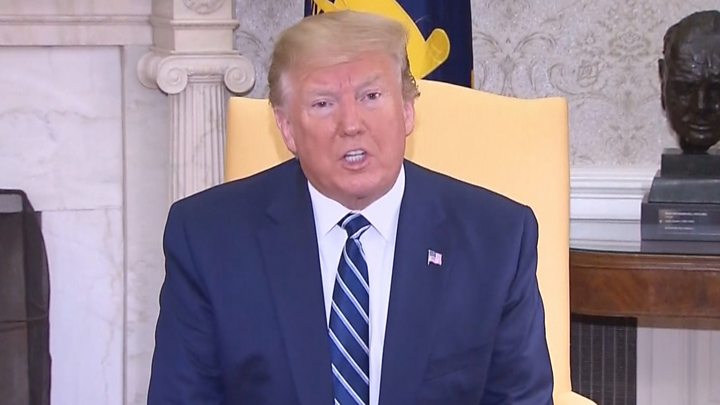 Image copyright
Image copyright
Getty Images
President Donald Trump, pictured with Saudi Arabia’s Crown Prince, holds a chart showing US military sales to the kingdom
The US Senate has voted to block the sale of billions of dollars’ worth of weapons to Saudi Arabia, striking a blow to President Donald Trump.
Mr Trump bypassed Congress last month in an attempt to push through the $8bn (£6bn) deal, citing threats to Saudi Arabia from its bitter rival Iran.
But on Thursday – in a rare bipartisan act – the Republican-led Senate passed three resolutions to prevent the sale.
The president has promised to veto the action, leaving the deal in limbo.
While the Democrat-controlled House of Representatives is also likely to vote to block the sale, analysts say it is almost certain Congress will not have the necessary votes to override a veto from Mr Trump.
The first and second resolutions of disapproval passed by a margin of 53-45 and a third vote, which covered a number of other resolutions relating to the arms sale, passed by 51-45 votes.
- US-Iran tensions explained
- Iran nuclear crisis in 300 words
- Trump: Iran made ‘bad mistake’ downing drone
As well as Saudi Arabia, weapons would also reportedly be sold to the United Arab Emirates and Jordan under the deal.
Mr Trump bypassed Congress last month by invoking a rarely used aspect of federal law. He declared that ongoing tensions with Iran amounted to a national emergency, meaning the sale of weapons – including precision-guided bombs – was a matter of urgency.
But the move sparked fierce opposition on Capitol Hill from those who feared the weapons may be used against civilians in Yemen by Saudi-led forces.
Just hours before the vote, Iran shot down a US military drone over the Strait of Hormuz.
This escalated fears of a wider conflict and will no doubt reinforce the administration’s argument that its allies need these weapons.
President Trump has promised to veto the Senate action in order to proceed with the deals, and lawmakers almost certainly do not have enough votes to override that.
But they will keep up their legislative resistance in other ways, because they are afraid that the administration will try to bypass them over any decision to launch a military strike on Iran.
Members of Congress have also heavily criticised Saudi Arabia’s human rights record over its role in the Yemen conflict and the murder of Saudi journalist Jamal Khashoggi in Istanbul last October.
On Wednesday, the UN said there was credible evidence that Saudi Arabia’s Crown Prince Mohammed bin Salman and other high-level officials were liable for the killing of Mr Khashoggi.
Saudi agents killed the journalist inside the country’s consulate in Istanbul, but Saudi authorities insist they were not acting on Prince Mohammed’s orders.

The Senate vote comes on the same day that campaigners in the UK won a legal challenge over the government’s decision to sell arms to Saudi Arabia.
A court in London ruled that Britain had acted unlawfully in the way it granted export licences for arms exports to the kingdom.
What has the reaction been?
In a statement, the White House said blocking the sale “would send a message that the United States is abandoning its partners and allies at the very moment when threats to them are increasing”.
This was echoed by Republican Senator Jim Risch, who said that “to reject these sales at this time and under these circumstances is to reward recent Iranian aggression and to encourage further Iranian escalation”.
But those who voted to stop the deal – including seven Republicans who broke ranks – were not convinced.

Democratic Senator Robert Menendez, who sits on the Foreign Relations Committee, said the vote was a reminder that Congress could not be ignored.
“This is a power grab, pure and simple,” he said of Mr Trump’s attempts to push the deal through. “[It will have] lasting implications for the role of Congress in the sale of arms around the world.”
Republican Senator Lindsey Graham, who usually supports Mr Trump, voted to block the sale and was forthright in his criticism of Saudi Arabia.
“My relationship with Saudi Arabia is forever changed,” he said in a speech before the votes.
“The reason I’m voting [to block the sale] is to send a signal to Saudi Arabia that if you act the way you’re acting, there is no space for a strategic relationship,” he said.
US Senate votes to block Trump’s $8bn Saudi arms sale

